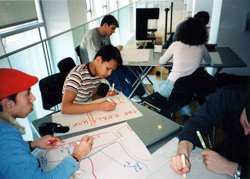The basic aims and goals of SAVE THE CHILDREN MACEDONIA are:
-to provide the basic needs of the children, substantial to their very existence
WEBSITE THAT IS MADE BY & FOR KIDS :-)
-to provide a positive psycho-psysical development of the child's personality
"...the child should be fully prepared to live an individual life in society, and brought up in the spirit of the ideals proclaimed in the Charter of the United Nations, and in particular in the spirit of peace, dignity, tolerance, freedom, equality and solidarity..."Convention on the Rights of the Child
-to protect the children of any political, economic, corporal or religious abuse and exploitation
-to help children to exercise their right of being directly involved in all decisions that are affecting their lives
Children's rights: A second chance looks at the impact that local, national and international policies and practices have had on children over the last decade.
-a right of an efficient educational system
-a right of free self-expresement.
This rights are very important for every chaild in the world. So respect the children and let htem live like they deserve.Teach them on every thing useful for their life.
Read this poem it's dreat.
A poem: Papi y Mami
My hands are small that's why I spill the milkeven though I don't want to.
My legs are short, please wait for me and walk a little slower, so that I can walk with you.
Please look at me when I speak to you, that way I know that you are listening.
My feelings are fragile, don't scold me all day long.
Let me make mistakes without making me feel stupid,
Please remember that I am a child and not a small adult and at times I don't understand what it is you want of me,
I would like it very much if you would think of me Help me and listen to me.
Thursday, July 19, 2007
How the word would be if we didn't have teachers?
At first, in the past people were improving their knowledge by transfering it from one generation to another, starting from how they can hunt, invent things, deal with the life. The parents were and they still are the first contact to getting to know the world around them. But as a second best is the teacher. They teach the child from early age and shape their character.
I personaly can not imagine the world without teachers in it. They are there to show children what is out there in the world and develop their interests.
Teachers are doing a very important job in the world, this is why they are respected - see my link for teachers days around the world. Children look up to them, and some of them even idolise them. Children who do not attend school and are not homeeducated are very disadvantaged and they might have social problems as well as other dificulties that might come up later in life.
So, i'm oppening a discussion on this toppic and if you have some thougts please write to me. I would love to hear what you think.
Katerina
I personaly can not imagine the world without teachers in it. They are there to show children what is out there in the world and develop their interests.
Teachers are doing a very important job in the world, this is why they are respected - see my link for teachers days around the world. Children look up to them, and some of them even idolise them. Children who do not attend school and are not homeeducated are very disadvantaged and they might have social problems as well as other dificulties that might come up later in life.
So, i'm oppening a discussion on this toppic and if you have some thougts please write to me. I would love to hear what you think.
Katerina
Monday, July 16, 2007
Pedagogy introduction
As I' m studying pedagogy as my major, the main topic that i will discus here will be the things related with it.
First of all, I want to say some things that I know about what is education, where comes the word pedagogy from and etc.
The word pedagogy comes from the Ancient Greek (paidagōgeō) which comes from child and lead - ago-agein and that means "to lead the child”. In Ancient Greece the teacher usually was a slave who supervised the education of his master’s son (girls were not publicly educated). This involved taking him to school or a gym, looking after him and carrying his equipment (e.g. musical instruments first).
For me the education is learning, discovering, socialising, getting the people together in every second of their life no matter their age. Learning also is a process in which the learner actively constructs or builds new ideas or concepts based upon current and past knowledge. In other words, "learning involves constructing one's own knowledge from one's own experiences." Constructivist learning, therefore, is a very personal endeavor, whereby internalized concepts, rules, and general principles may consequently be applied in a practical real-world context.The teacher acts as a facilitator who encourages students to discover principles for themselves and to construct knowledge by working to solve realistic problems. This is also known as knowledge construction as a social process (see social constructivism). We can work to clarify and organize their ideas so we can voice them to others. It gives us opportunities to elaborate on what they have learned. We are exposed to the views of others. It enables us to discover flaws and inconsistencies by learning we can get good results. Constructivism itself has many variations, such as generative learning, discovery learning, and knowledge building. Regardless of the variety, constructivism promotes a student's free exploration within a given framework or structure.
If you have some ideas about it please write to me.
First of all, I want to say some things that I know about what is education, where comes the word pedagogy from and etc.
The word pedagogy comes from the Ancient Greek (paidagōgeō) which comes from child and lead - ago-agein and that means "to lead the child”. In Ancient Greece the teacher usually was a slave who supervised the education of his master’s son (girls were not publicly educated). This involved taking him to school or a gym, looking after him and carrying his equipment (e.g. musical instruments first).
For me the education is learning, discovering, socialising, getting the people together in every second of their life no matter their age. Learning also is a process in which the learner actively constructs or builds new ideas or concepts based upon current and past knowledge. In other words, "learning involves constructing one's own knowledge from one's own experiences." Constructivist learning, therefore, is a very personal endeavor, whereby internalized concepts, rules, and general principles may consequently be applied in a practical real-world context.The teacher acts as a facilitator who encourages students to discover principles for themselves and to construct knowledge by working to solve realistic problems. This is also known as knowledge construction as a social process (see social constructivism). We can work to clarify and organize their ideas so we can voice them to others. It gives us opportunities to elaborate on what they have learned. We are exposed to the views of others. It enables us to discover flaws and inconsistencies by learning we can get good results. Constructivism itself has many variations, such as generative learning, discovery learning, and knowledge building. Regardless of the variety, constructivism promotes a student's free exploration within a given framework or structure.
If you have some ideas about it please write to me.
Subscribe to:
Comments (Atom)













